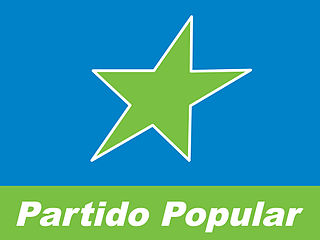
The Popular Front in Spain's Second Republic was an electoral coalition and pact signed in January 1936 by various left-wing political organizations, instigated by Manuel Azaña for the purpose of contesting that year's election. In Catalonia and today's Valencian Community the name of the coalition was Front d'Esquerres.

The Galician Nationalist Bloc is a political coalition of left-wing Galician nationalist parties. It is self-defined as a "patriotic front".

Guillermo David Endara Galimany was President of Panama from 1989 to 1994. Raised in a family allied to Panameñista Party founder Arnulfo Arias, Endara attended school in exile in the United States and Argentina following Arias's removal from power. Endara later received a law degree in Panama. He subsequently served as a member of Panama's National Assembly, and briefly as a government minister before heading into exile again following Arias' third overthrow.

The Democratic Revolutionary Party is a political party in Panama founded in 1979 by General Omar Torrijos. It is generally described as on the centre left.

The Nationalist Republican Liberal Movement is a center-to-right, pro-business liberal political party in Panama.

The People's Party is a Panamanian Christian democratic political party. It was one of Latin America's most conservative and anti-communist Christian democratic parties. The ideological foundation of the party is based on the social doctrine of the Catholic Church.

People's Party of Panama is a communist party in Panama. It was founded on 4 April 1930 as the Communist Party of Panama, after Panamian communists broke away from the Labour Party. Early leaders of the PCP included Eliseo Echévez and Cristóbal Segundo. The PCP joined the Communist International and reached its apogee of popularity during and right after World War II. In 1943 the PCP changed its name to the People's Party of Panama.

The Civic Renewal Party was a Panamanian right liberal political party.

Nicolás Ardito Barletta Vallarino is a Panamanian politician, served as its President from October 11, 1984 to September 28, 1985, running as the candidate of the Democratic Revolutionary Party (PRD) in the contested elections of 1984. He was considered a puppet for then-Panamanian military leader Manuel Noriega.

The Panameñista Party is a Panamanian political party.
The Republic of Panama held a general election on 6 May 1984, electing both a new President of the Republic and a new Legislative Assembly.
Panama held a general election on 7 May 1989, with the goal of electing both a new President of the Republic and a new Legislative Assembly. The two primary candidates in the presidential race were Guillermo Endara, who headed Democratic Alliance of Civic Opposition (ADOC), a coalition opposed to military ruler Manuel Noriega, and Carlos Duque, who headed the pro-Noriega Democratic Revolutionary Party (PRD).
The Republican Party was a Panamanian right-wing political party.
Labor and Agrarian Party was a Panamanian right-of-center political party, founded in 1960.
Popular Action Party was a Panamanian political party.
The Socialist Workers Party was a Panamanian Trotskyist political party.
The Socialist Party was a Panamanian left-wing political party created in 1933 by intellectuals and labor unionists who split off from the Liberal Party and rejected the Communist Party.
Ricardo Arias Calderón was a Panamanian politician who served as First Vice President from 1989 to 1992. A Roman Catholic who studied at Yale and the Sorbonne, Arias returned to Panama in the 1960s to work for political reform. He went on to become the president of the Christian Democratic Party of Panama and a leading opponent of the military government of Manuel Noriega. In 1984, he ran as a candidate for Second Vice President on the ticket of three-time former president Arnulfo Arias, but they were defeated by pro-Noriega candidate Nicolás Ardito Barletta.
Genaro López Rodríguez is a Panamanian union leader and politician. He is best known as secretary-general of the building workers' union Suntracs, 1990–2010; as leader of the Frenadeso movement for economic and social rights; and as presidential candidate on behalf of the Broad Front for Democracy, party in the 2014 elections.











